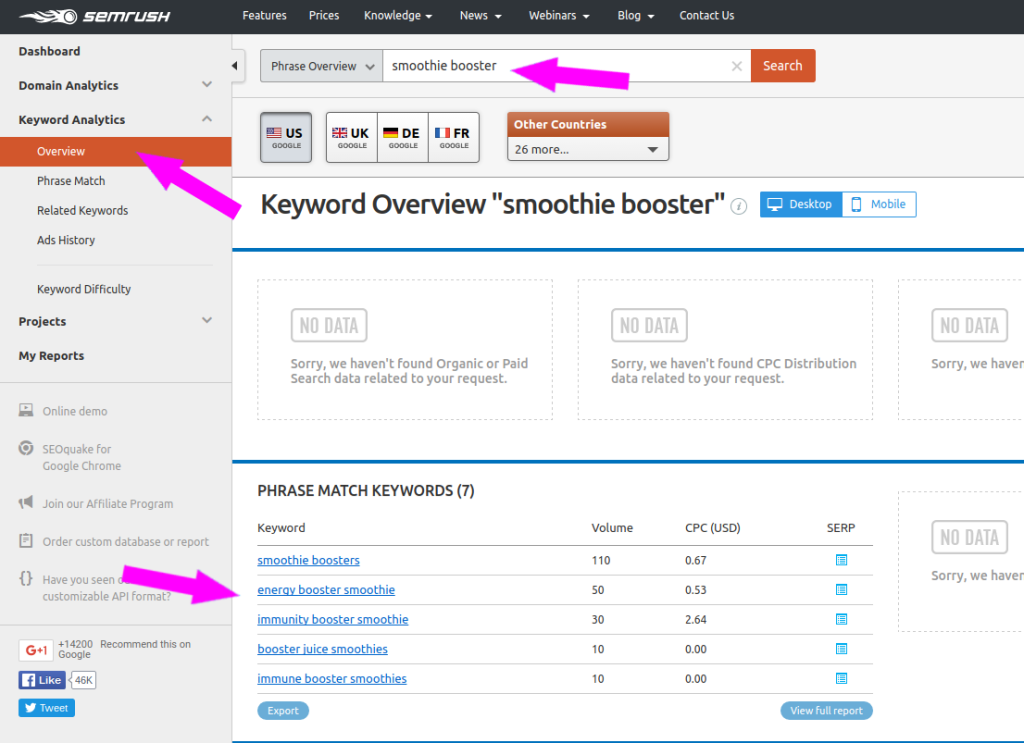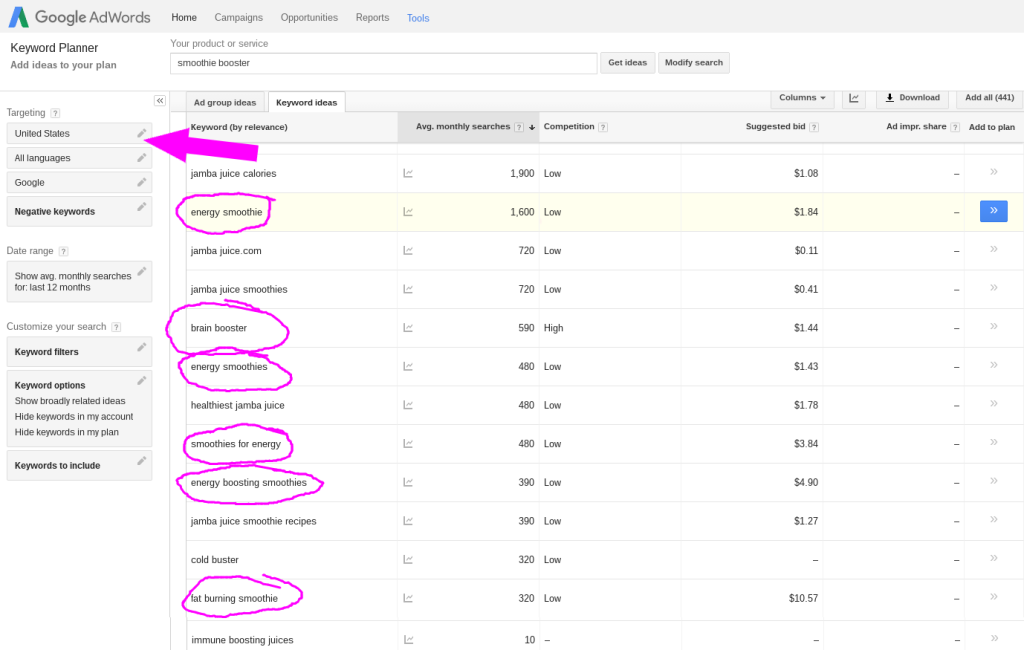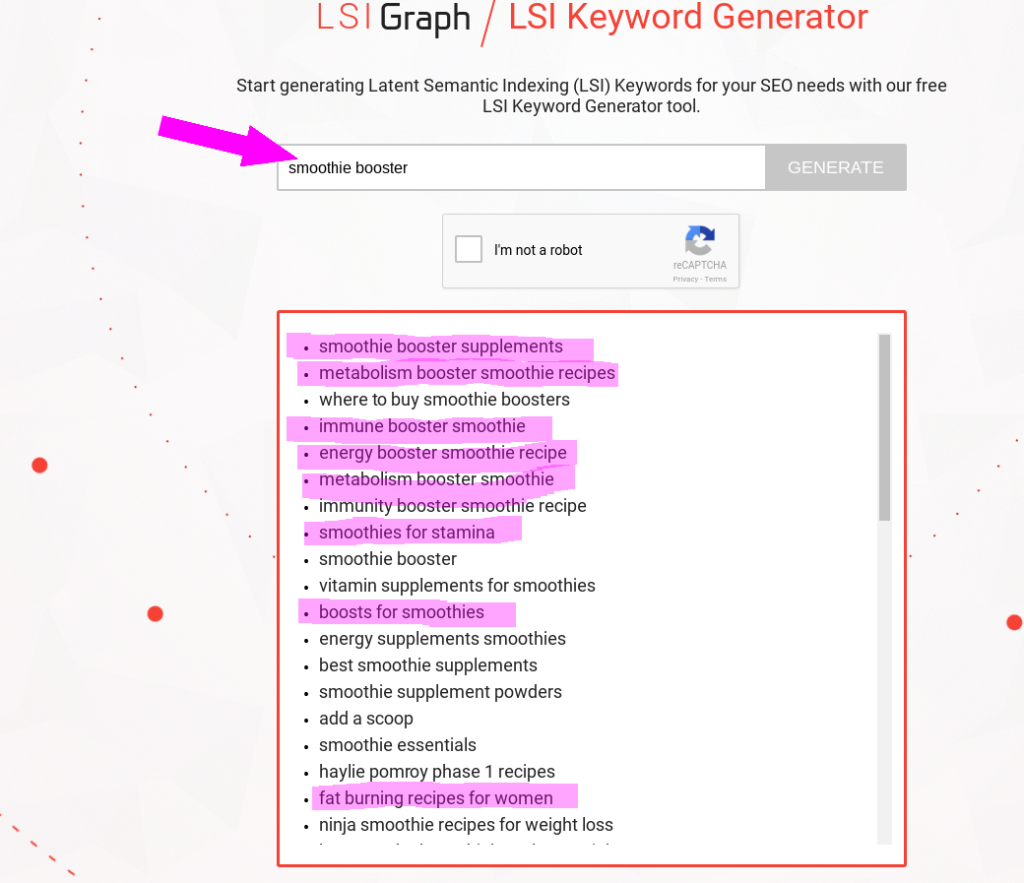How To Choose Keywords For SEO
Share this Post
Learning how to choose keywords for SEO is one of the hardest parts of optimizing content for Google and other search engines. Countless articles are outlining best practices, tips & tricks, and SEO “gurus” who share their “secret tips” to get you ranked and drive traffic to your website. The topic of keyword research came up during our Orlando SEO Site Clinic Meetup on 4/21, so I thought I would take some time to write out the exact steps I take when researching keywords to use for business websites and blog posts.
In today’s guide, I am going to use a site from our previous Orlando SEO Site Clinic Meetup group. The website is http://thehealthysmoothierecipe.com/ and the during the Meetup we looked at some ideas for keywords. I thought this was an excellent time to dive into the tools and process to find quality keywords to help this website increase traffic.
Using The Right Keyword Research Tools
Before we get started, I wanted to point out that there are many free keyword research tools out there to learn and experiment with. Each tool has its benefits and value.I have used many of the best tools out there, but to be honest, many of them deliver the same information and quality. I believe I have found a great process and set of tools to help me discover the best keywords to help boost SEO rankings and drive traffic to content.The short list of tools I will be showcasing here today include:
- Google Keyword Planner Tool
- SEMRush (I use the paid version, but will use the free version here)
- LSIGraph.com
The Right Process To Find SEO Keywords
The most important part of keyword research is your audience. Your audience is who you are writing for, and they should be you focus as you are developing content for your website or blog. Whether you are focusing on an audience just in Orlando or looking to attract an audience from throughout the United States, it is vital to understand the demographics of your readers before you begin researching for SEO.This is a larger discussion, but I have seen too many businesses start producing content for an undefined audience. Each time these companies have wasted a lot of time and energy and failed to attract the type of audience they needed. I have put together some ideas to help you discover who your audience is on my blog so be sure to check that out before continuing with this guide.
Keywords Based On Your Audience
During the Meetup, we learned some vital information about the target audience Jeanette is writing for on her blog about smoothies. Here is an overview of her target audience:
- Her content is geared toward women between the ages of 20-50
- Her audience is primarily working women who have limited time, so they want to drink smoothies as they drive to work, etc.
- Her audience is health conscious and wants to improve their health and lives by drinking healthy smoothies
With this information, we will be able to make some assumptions and begin searching for keywords to help direct her audience to the smoothie recipe website. It is important always to keep your audience at the forefront of your mind as you are researching SEO keywords. If you do not think about who is consuming your content, then you will begin straying from the core message and purpose that your audience is looking for. In other words, if you forget about your audience then your content, no matter how high your keywords, will be garbage.
Using SEMRush to Start Keyword Research
Working on the information, Jeanette told us about her target audience; we started working with the keyword “Smoothie Booster.” This seems like a great starting point to build a blog post for her Orlando readers.
The first step I take to find great SEO keywords is to go to SEMRush to take a look at related keywords. I type the keyword in the search bar, then look at “Related Keywords.” Since this is the free version of SEMRush you will only receive five keyword suggestions, but to be honest, this is more than enough for our purposes here.
Once I find the keywords in SEMRush, I pay particular attention to the “Volume” and “CPC” columns. I add these keywords to Word Doc, and we will use them for the next steps.
Google AdWords To Hone Our Focus
Now that I have a good list of keywords to work with from SEMRush, I turn to the Keyword Planning Tool to get a wider view of what people look for in this industry.This is one of the most powerful free SEO keyword research tools available because it allows you to enter detailed information about the keywords you want to learn about and your target audience. For this example, I am targeting the entire United States. It is a good idea to start big regarding audience and then refine your research depending on your needs.
After searching for “Smoothie Booster” I found some interesting information:
- This search term is dominated on a national level by Jamba Juice. This brand does some heavy content optimization, so it makes sense they show up frequently in this industry.
- Energy smoothies and similar search terms have high average monthly searches and low competition. This means there could be an opportunity using this phrase.
- Energy boosting smoothies look like a good option to continue researching for potential optimization opportunities.
- Fat burning smoothies is also a good option to consider further based on the target audience and how it is ranking in AdWords.
It is important to note that results from the Keyword Planning Tool are from AdWords, so your keywords are based on PPC. While similar in many ways to organic SEO, user intent, and other strategies vary widely, so these results are not meant to be used for organic SEO keyword decisions. However, I like to use Keyword Planner as a data point to point me in the right direction and understand next steps.
I take this list of keywords from Keyword Planner and write down the keywords, average monthly searches, and competition level on the same Word doc as before. I now have a list of about ten great keywords to use based on Keyword Planner and SEMRush.
LSIGraph To See Any Missed Keyword Opportunities
The last tool I use to research SEO keywords is LSIGraph.com. This tool helps me understand other related keywords that are similar to, but not connect with, the keywords I am interested in promoting. LSIGraph is a great tool to find keywords and phrases that you did not think of before and helped you get a better understanding about how Google categorizes your keywords based on its algorithm.Here we see a list of what LSIGraph.com thinks are similar keywords related to the phrase we are interested in.
We find some interesting findings that we can use in future blog posts and do more research on to see how we can drive traffic to our site. Here are some things I found absorbing:
- Much like our findings with Keyword Planner, metabolism, and energy boosters are high on the list. I would make special note of this occurrence.
- Stamina also appeared on the list. This makes sense considering the other terms that appeared, and I would also begin researching this keyword for opportunities.
- Women are searching for fat burning recipes looked. Considering the time of year (early summer), this makes sense. I would continue researching based on the date of year to find out what smoothie boosters are most popular and create content around those findings.
I will now add the keywords and phrases from LSIGraph.com to the Word doc that I have been keeping track of to understand all the keywords I have discovered. This type of information gives great insight to what people are searching for and shows me opportunities for content to address needs of the target audience.
Putting Your SEO Keywords Into Action
Now that I have a great list of keywords to use in future blog posts and help optimize website pages. This information can be used to help research what competitors are doing in the same market. It is very helpful to know what your competitors are writing about because this can help you:
- Get more ideas to write about based on their research
- Find opportunities for more content that your competition is not addressing
- Reverse engineer the SEO strategy used on their site and content
Continue researching keywords to boost your SEO keywords. Your time and energy will help you develop content to attract your target audience and grow your website. Increased traffic will give you the best chance to boost conversions and grow your bottom line!
Share this Post




